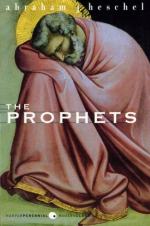
|
| Name: _________________________ | Period: ___________________ |
This test consists of 5 multiple choice questions, 5 short answer questions, and 10 short essay questions.
Multiple Choice Questions
1. What attitude does Heschel take to other points of view that he uses in his book?
(a) Respectful.
(b) Derogatory.
(c) Supportive.
(d) Disparaging.
2. Heschel admits that pathos is both a paradox and what?
(a) A commandment.
(b) A divine concept.
(c) A mystery.
(d) Easy to explain.
3. What cultural/religious doctrines did Philo try to mix in his studies?
(a) Greek and Islamic.
(b) Jewish and Egyptian.
(c) Egyptian and Islamic.
(d) Greek and Jewish.
4. Why did some scholars reject the idea of pathos?
(a) Because it isn't mentioned in the Bible.
(b) Because it involved emotions.
(c) Because of its origins.
(d) Because it didn't involve emotions.
5. One view that Heschel discusses is that an outstanding feature of a poet's consciousness is the sense of being what at the moment of inspiration?
(a) Rational.
(b) Taken over by another.
(c) Passive.
(d) In control.
Short Answer Questions
1. Heschel describes God as what?
2. Jeremiah the prophet said that God delights in what?
3. Heschel says that Moses would have taught what kinds of rules of right living to the people?
4. To what does Heschel compare the words of the prophet?
5. Heschel looks at the theory of ecstasy but limits it to what?
Short Essay Questions
1. How does Heschel explain the beliefs that the prophets were frauds?
2. Who was Marcion?
3. What is Heschel's theory of ecstasy and the prophets?
4. Do all scholars agree with Philo's view of ecstasy and the prophets?
5. Why does Heschel say Karma is opposed to prophetic thinking?
6. To what does Heschel compare the descriptions of prophecy?
7. What does Heschel describe as the end to indifference?
8. What is the purpose of ecstasy, as explained by Heschel?
9. Describe one view of ecstasy and prophets that Heschel describes.
10. Why does Heschel think it is hard for people to understand the wrath of God?
|
This section contains 557 words (approx. 2 pages at 300 words per page) |

|




